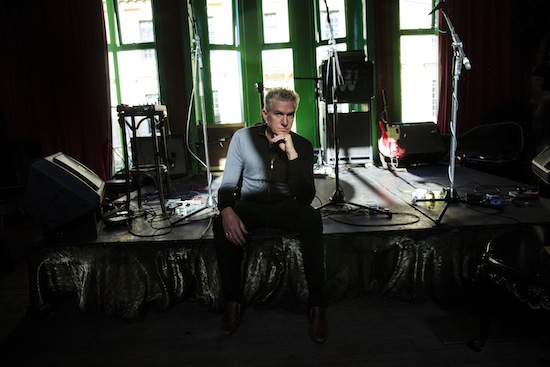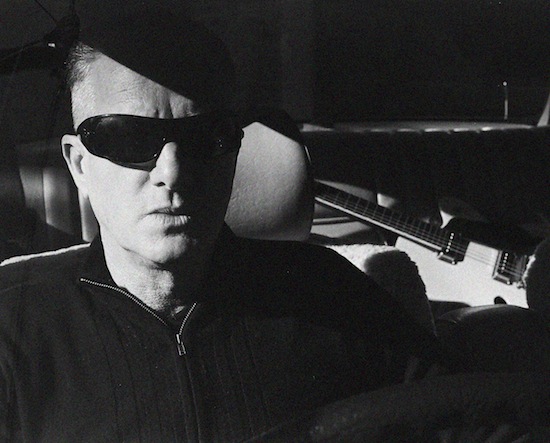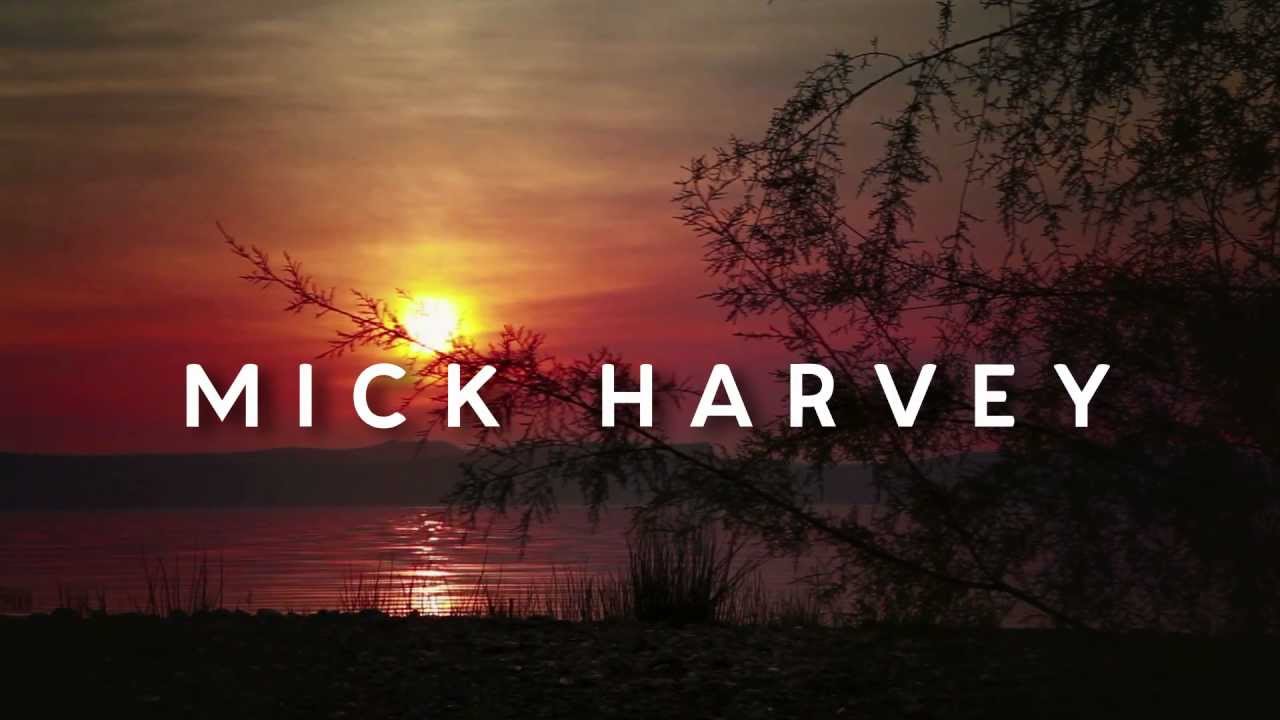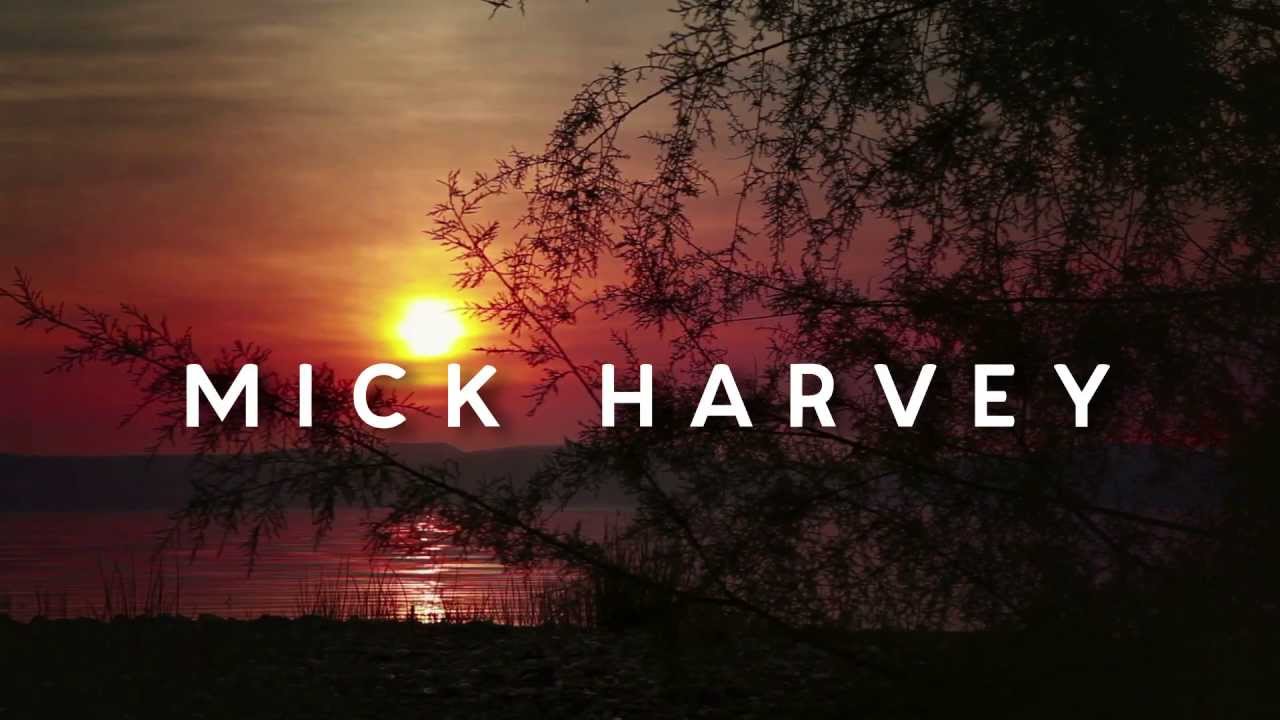Mick Harvey laughs a lot. Like, an awful lot. Mostly at the end of his own sentences, like an exclamation mark punctuating his thoughts. His laugh bursts out at unexpected moments, much louder than his speaking voice does, over the phone from his studio in Melbourne. It’s late evening there and early morning here when we speak and Harvey has just laughed off the fact that I missed the interview we had initially scheduled for 48 hours earlier. Having read classic interviews with Harvey and the rest of his former gang, The Bad Seeds, conducted when they weren’t interested in communicating anything but disdain for journalists, I had been a little worried about the impact my own tardiness would have on our conversation.
I need not have been. The dark, driven angst and sometimes outright nihilism that marked his early career in The Birthday Party and The Bad Seeds is long gone. These days Harvey is a family man, living in Melbourne, the same city where he grew up in the 60s and 70s. Having left The Bad Seeds and ended his 36-year working relationship with Nick Cave in 2009, Harvey has been free to concentrate on the solo work he began a decade or more earlier, as well as producing and collaborating with friends.
He’s just released his sixth solo record, FOUR (Acts Of Love), a collection that sees him performing songs by Van Morrison, Roy Orbison, The Saints and a previously unreleased track from his frequent collaborator, PJ Harvey, alongside short interludes penned by Harvey himself.
When we speak Harvey is preparing for the first live outing of one of a project begun in the mid 90s, when he recorded two CDs worth of Serge Gainsbourg songs in English, Intoxicated Man and Pink Elephants. He and his band, including many of the musicians who played on the original CDs, are getting ready to perform the songs at ATP’s I’ll Be Your Mirror event in London and rehearsals are in full flow.
Are you happy with how FOUR (Acts Of Love) has turned out? Did it take long to come together?
Mick Harvey: I’m happy with the album, yeah. I got back from Europe last year and realised that if I wanted to get a new thing out this year, and finish the project that I’d started, I should have been working on it in November and December. I just didn’t feel in the mood and before I knew it, it was Christmas and I’d been doing other stuff. Then I kind of thought, at the last minute, "Maybe I’ll see if I can turn it around." It was all put together very quickly in the end which was quite funny considering it had been sitting there for four or five years.
In an odd way it has a very spontaneous aspect to it which is probably good because I could have just sat there and gone, "Oh it’s been in the pipeline for four or five years I had better mull over it and really overwork it." But I kept going with the next idea and then just finalised it, it was good.
Do you find it’s hard to let projects go, to say they are finished?
MH: A little bit. On one hand, I really want things to be as perfect as possible, and on the other I don’t want to have to do the work! I know how much work is involved in getting things up to a particular standard because I’ve done it so many times with albums. Thankfully you don’t have to do spend as much time mixing these days because the computers do so much of the stuff for you. They just store all this stuff that you’ve thought of and as you’re working through stuff, you get to the mixing stage and it’s pretty much all there anyway. Which is fantastic, it just means it takes a lot less time to mix stuff. You have to really concentrate and commit yourself to where things are up to. It’s hard work, the final stage, just actually finalising it and saying, "That’s it." I like to get through it as quickly as possible, if at all possible. Just go, "Yeah, that’s good, that sounds great, I should be happy with that." That’s more the way I operate now, just like, "What could be wrong with it?" It’s more like that now.
You put the word “love” right there in the title. That’s a pretty bold move in some ways, it sets out the stall pretty clearly.
MH: Yeah I know, it’s a bit of a drag. The suggestion for the title came up and I was like, "Ugh". It’s so loaded, you know? But in the end, it made sense, in a way. There are a few songs on there with love in the title. It’s clearly a central theme to the songs and the song cycle. Somehow I couldn’t argue with it. It was a suggestion from someone else, Acts of Love, and I just had to accept that they were probably right.
Did you find it a difficult topic to sing about? It’s such a well-worn subject, was it hard to make the songs resonate with you?
MH: Not really. Ostensibly, the story on the album is not about me. It’s a general story, constructed as a piece of fiction which could be about anyone who falls in love and it doesn’t work out and they end up back at the beginning. So many people have been through this, that it felt like a pretty easy construct to make believable. It is a pretend story. In fact, there’s not really a story there, it’s all just inferred. That’s partly why I constructed it to have three acts, just to make it clear that there was a story in there. I think without that, it might have been a bit lost on people. That was to help guide people to that idea of the song structure and song cycle.
It also plays into a whole lot of other aspects of how ubiquitous the subject of love is in art, literature and music and how romantic love is such a common and overused theme in popular music. It throws up a challenge to question what that’s all about while at the same time kind of embracing it. It threw up a lot of different possibilities for me to look at the subject itself and the very nature of that thing in popular culture and pop music and what that’s all about really. I think I’m questioning that as much as anything else in my little interlude numbers that I wrote to link all the pieces together. That really became an interesting challenge.
You’re covering a lot of songs on the album but was there a specific process involved in picking the songs you ended up recording?
MH: I looked at songs that meant a lot to me, that I felt a strong personal connection with, that I thought deserved to be aired and that I thought would suit me. I looked at songs that let me do something with them that hadn’t already been done. That is the other criteria really because if you’re just going in there and re-doing what someone else has already achieved with the song, there’s not much point to it. I think that’s quite clear for instance with the Van Morrison song, which is a very risky thing to do, a song like that which is such a classic and so well known in certain circles, but it’s done in such a different way. I think it’s really a case of looking at the central core of that song, which is very strong in the original in my opinion, but which a lot of people, I find, miss. They miss what that song is really about in some ways, which is interesting. They get so immersed in the brilliant music and the fantastic arrangement and the performance, and obviously it’s called ‘The Way Young Lovers Do’ but it’s a very heartfelt, emotional song. I don’t know what people think when they miss what the song is about, but clearly they do because I’ve had a few people say to me, ‘I really heard the song quite differently when I heard your version, there were things that I hadn’t realised were in that song.’

Well, what do you feel that song is about?
MH: It’s about the blossoming of young love, the excitement of young love and that sense of wonder and how everything is contained in it. It’s like the whole universe is in there. ‘We sat on our own star’, it’s like you’re above everything in that state. I mean it’s complete fantasy but that’s the way you feel. Total exhilaration, that’s what it’s about.
And what do you think those who have missed the point think it’s about?
MH: Well I don’t know, maybe they think it’s about just having a good romp in the grass! You’d have to ask them! An awful lot of people don’t really hear the words, this is something you realise working in song-based music. There’s the famous incident with Martin Sharp, the Australian pop artist who wrote some lyrics for Cream and did the cover for Disraeli Gears. He was in the men’s room at the urinal one day, and there was someone standing next to him whistling ‘White Room’ by Cream and he turned and said, ‘I wrote the lyrics to that song’ and the guy said, ‘I’m not whistling the lyrics.’ I think that sums it up! A lot of people don’t really take the lyrics in, not specifically. A lot of lyrics get missed. When I do songs, that’s one of the fundamental things that I’m looking for, I’m really trying to get to the core of the songs and what the lyrics are saying. I pick songs that are really strong in that area, where I’ve really heard something in the lyrics that I find very potent and they’re very well written or are very strong. I just to present that, to present the song so you can really hear that aspect of it.
I read before that you were a little uncomfortable in the role of the front-man. Do you find it easier now to be the one singing the songs, being at the front of it all? Has it got easier over time?
MH: I’m not sure if I find it easy. I’m not sure how I feel about that. I suppose I feel more comfortable about having written things. Early on, with the first things that were coming out, on One Man’s Treasure, there were songs that I’d written and there were just one or two of them, it felt a bit odd to be exposing stuff like that. I guess I do feel more comfortable with it, yeah.
Does it make a difference that you’re often singing other peoples’ songs? Is there less of you at risk that way, in a sense?
MH: In a way, it all just feels the same to me. Once I start working on a piece of music or using a song or lyrics and I’ve chosen to work on it, it’s really the same exercise, the same procedure in trying make it as effective as possible and I’m no longer really concerned if it’s mine or anyone else’s. It kind of becomes irrelevant when you get stuck into it. The challenge is the same, once the choice is made to do it, your responsibility is to make it as good as you can, to have your kind of print on it.
Mick Harvey live in May:
Sat 11 – Kunstencentrum, Hasselt, Belgium
Sun 12 – Espace B, Paris, France
Wed 15 – Folken, Stavanger, Norway
Thu 16 – Hulen, Bergen, Norway
Sat 18 – Roter Salon, Berlin, Germany
Thu 23 – CCB, Lisbon, Portugal
Fri 24 – CCVF, Guimaraes, Portugal
Sat 25 – Teatro Aveirense, Aveiro, Portugal
Mon 27 – Nublu, Istanbul, Turkey





